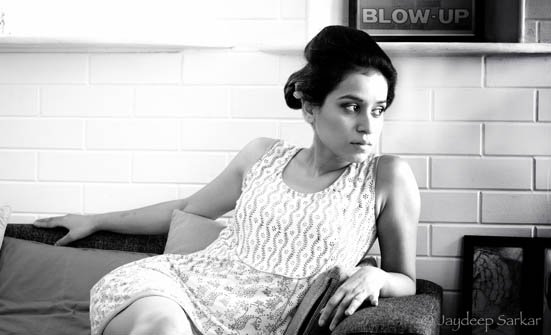
You could call her a crossover actor, considering she’s starred in foreign films as well as Indian ones. You recently saw her play the subdued wife to a man fighting against land grabbing in Dibakar Banerjee’s movie based on the novel Z called Shanghai. Actor Tillotama Shome, who was in Mira Nair’s Monsoon Wedding, talks about Shanghai, Irrfan Khan, working with prison inmates and innovative pedagogy. Sailesh Ghelani listens with interest.
In Shanghai you played a subdued woman in control of her emotions and Kalki (read her interview here) played the hysterical woman. In real life, which one would you probably be?
In real life I would like to be the subdued woman, but I have a feeling I might veer towards hysteria. On second thoughts I really have no clue how to answer this question truthfully.
How was it working with director Dibakar Banerjee on Shanghai (read the review here)?
My experience of working with Dibakar was an exercise in trying to achieve exactitude. He already knew how Aruna would look, dress and the trajectory she would walk. It was a clear blueprint drawn and locked. My initial reaction to this kind of clarity was claustrophobia as it left no room for improvisation. However, this is where Dibakar’s changes the game. He will fill you in with the back-story of the character with such virtuosity and then make you walk down a path that he has designed but make you feel like you have designed it yourself. He let me bite the wallet though, I must concede.
You’ve done a lot of offbeat cinema. Would you say Shanghai is your first real outing into a more commercial kind of cinema?
In retrospect it is. However, I have never taken up work based on calculations of it being offbeat or mainstream. The motivation has been the story, the character and the director, and often in that order. I am a sucker for taking on parts that I have never explored. I did an American film called Letters, only because I wanted to enact going through labour and berthing… an experience I am not sure if I have the guts to go through in real life.

You’ve worked with foreign directors as well. How do they work differently from Indian directors?
The foreign directors that I have worked with cared nothing for my star meter, my visibility in the press but were solely concerned with the nature of my audition. With the Indian directors the pressures from the producers to cast a star is way too much of a reality and only once in a while is that rule broken.
Someone like Irrfan Khan has one foot in Indian cinema and one firmly on foreign shores. What do you think it takes to do that successfully?
I think being an actor with great crossover potential comes primarily from being a damn good actor, versatile, deeply rooted in your own culture and hence being able to have branches that spread so wide. If you don’t know where you come from, it is tough to go anywhere. Also if you like the comfort of being the king of your little well, then you will never risk loosing it all by jumping into the sea. Irrfan has the rootedness and the lack of fear.
Did theatre lead you to acting in films? And are you still involved in theatre?
Yes theatre led to films and films to theatre. Unfortunately, not enough theatre now though. My last theatrical production in Mumbai was with Rehan Engineer. I am searching for the right opportunity in theatre to learn, fall and hopefully rise again.
I read you were involved in ‘innovative pedagogy’. What’s that?
There are many fun ways to learn. Drama therapy or Educational Drama rocked my boat! Drama is like a rehearsal for life and hence when used skilfully can be very therapeutic. I worked in this field informally along with doing theatre and post Monsoon Wedding when I kept getting mild variations of Alice, I chose to go study Theatre at NYU and specialise in therapy.

You were involved in something called Creative Arts Team with social work in America. Tell us something about it.
The Creative Arts Team is the best educational theatre company in New York. I joined them and did drama work with prisoners and women in domestic violence shelters until 2008. I did not consider it social work though; in fact I hate the word ‘social work’. There are many people who work in NGO’S and so called ‘social work sectors’, who care nothing for their work, but look at it just as a pay cheque and yet stand on a higher moral ground!
I joined CAT because it had theatre practitioners who were doing cutting edge drama work. The cherry on top was that our audience were going to be those who are the most marginalised. They look at life, art with a lens that is unique and peculiar in its intensity. I learnt most about performance from the daily act that I saw the prison inmates put up just to survive.
With Indian movies going to Cannes and being showcased there it seems to be a great time for independent and good Indian cinema. Any thoughts.
I hear you man! I was offered a really lucrative job in New York back in 2008, but I felt the impulse to act in films again and the kind of films that were being made in India captured my imagination, heart and soul. The moment that thought came in more than once, I packed my bags and said goodbye to New York and said Hello to a Bombay drenched with rains. What a beautiful move! The last four years have been very exciting attempts at storytelling in cinema and I am so glad to be part of this nascent but new wave. Post Shanghai I feel thrilled to be part of Q’s trippy next film Tasher Desh and Qissa opposite Irrfan in Anup Singh’s unearthly fable. I am looking forward to finding out the audience’s reactions to these films.
Tell us something about your background that you haven’t shared as yet.
My parents were high school sweet hearts whose marriage has been a magnificent backdrop to my life. However, there are many things that I cannot comprehend because of my background. I do not understand paedophilia – ‘ a person’s need to have sex with a person who is not yet sexually aware.’ I cannot understand the stockpiling of nuclear weapons for a virtual war at the cost of developmental necessities like food, education and water…



0
comments